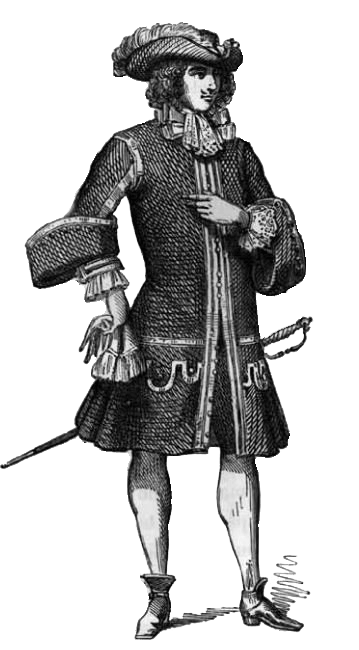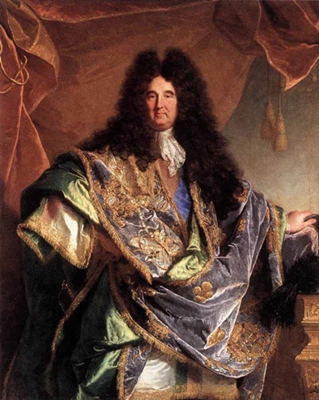Dangeau’s Diary, January 1687

January 5th. — Versailles. The Dauphine was taken ill in the night. The King called upon her before he went to mass and his Majesty has deferred the children’s baptism till her health is reestablished, which it is hoped will not exceed eight days. She took her dinner and supper in bed. Upon leaving the petit coucher, the King called the Comte de Gramont, and gave him the government of the province of Aunis, saying, it is the same which was held by the Duc de Nivailles. He, however, only held it by commission. I give it to you in perpetuity. The Comtesse de Gramont came to thank his Majesty for the government of Aunis. The King said to her, that he not only gave it her, but, added he, you have my per mission to sell it, and to make as much money of it as you can. The King took medicine, and after dinner sent for Bessiere, thanked him for his excellent advice during his illness, gave him the entreés of his chamber and forty thousand francs in money.
6th. — The King constantly attends chapel, and upon mass being over, visits Madame de Montespan, and after supper Madame de Montespan and Madame la Duchesse go up to his apartments. The archbishop of Albi died at Paris. This archbishopric and the Abbey of La Chaise-Dieu which are vacated by his death, are worth 1,000,000 livres per annum. His name was Seroni, he had been a jacobin and the companion of Cardinal de Sainte Cecile. Cardinal Mazarin employed him on many occasions.
11th. — The King presented the abbey of La Chaise-Dieu to Monsieur de la Rochefaucault, to divide the revenues of it among his uncles, the Abbe his brother, and the Chevalier, according to his discretion. The King told Father de la Chaise, that the Chevalier de la Rochefoucault should be the last Chevalier who should have pensions arising from benefices.
16th. — I am informed that the affair of the barriers of Namur is settled. The Spaniards have obtained from the King an engagement to remove his barriers five or six hundred toises back, in consideration of which they have ceded to France the small town of Valcow and the villages still in their possession between the Sambre and the Meuse.
18th. — The King entered the chapel early in the afternoon, and the three children of Monseigneur the Dauphin were baptised before mass. Monseigneur le Duc de Bourgogne was held by the King and Madame, and received the name of Louis. Monseigneur le Duc d’Anjou was held by Monsieur and Mademoiselle his daughter, and was christened Philippe. Monseigneur le Duc de Berry was held by Monseigneur, the Duc de Chartres, and by the Grande Mademoiselle, and was baptised Charles. The whole court was out of mourning, and wore magnificent dresses, especially the Dauphine, who, besides her own, had also the crown jewels. The ceremony was performed by the Bishop of Orleans. In the evening there was a salon and a grand ball, at which the King was present a considerable time. He then came to the card players, but did not join them. The Dauphine danced and could scarcely support her dress on account of its great weight. A cavalry officer lost his purse in the salon and the King ordered the hundred pistoles he had been robbed of, to be presented to him, saying that it was not just that a poor officer should lose the the savings of a whole year. After supper, Monseigneur played all day at different games with Madame la Duchesse, the Princesse de Conti, and all the young people who returned to sleep at Paris or Versailles.
27th.— Versailles. The academy caused a Te Deum to be sung in the chapel of the Louvre for the King’s recovery, and after dinner there was an extraordinary assembly which was open to the public, and at which many works in prose and verse were read. After supper there was a grand masked ball at Monsieur le Grand’s, in the chateau. It is a matter of discussion whether the wife of the Mayor shall dine with the King at the Maison de Ville. Monsieur and Monseigneur are of opinion that she should, and quoted the example of the Queen-mother, who, going into the country to Madame de Couton, the wife of a Counsellor, made her dine with her at the same table. They say, that to go to the Maison de Ville, is to go to the Mayor’s. It is, however, supposed she will not have that honour.
30th. — Versailles. The King left here at ten o’clock. In his coach were Monseigneur, the Dauphine, Monsieur, Madame, the Grande Mademoiselle and Madame la Duchesse. Monsieur de Chartres and the Petite Mademoiselle waited for the King at the Maison de Ville. His Majesty went to hear mass at Notre Dame, and desired that there might be no soldiers stationed in the streets, in order that the people might be at greater liberty. There were only a few placed at Notre Dame, and the Maison de Ville, in order to facilitate the approach of the carriages. From Notre Dame, the King went to the Maison de Ville, where he sat down to a magnificent dinner. There were covers for fifty-five. All the princes of the blood, the King’s children, and all the ladies of his suite, dined with his Majesty. The Mayor waited upon them at table. His wife waited upon the Dauphine and that very evening the poor woman had a fit of apoplexy. No King had ever before dined at the Maison de Ville. There are some instances of their having partaken of collations there, and the King himself had been there in 1648 and 1653, and at the ball had asked Madame le Teron, wife of the Mayor of that day, to dance. The Parisians testified the greatest joy at seeing the King; all the shops were closed; fountains of wine were playing throughout the day, and many fire-works during the night. The King alighted at the Place des Victoires, to examine the statue. The Dauphine went into a house, and appearing on the balcony, threw from thence money among the people. From the Place des Victoires the King proceeded to the Place de Vendome, which was very brilliantly illuminated. He alighted there also, and by five o’clock, we had again left Paris. On the road as far as Sévre, we saw a great number of rockets, and upon the bridge of Sévre a very pleasing illumination, and excellent fire-works. This compliment to the King upon the road, was from Monsieur de la Feuillade. In the evening, at Paris there was a grand ball at the Maison de la Ville, at which the Duc de Chartres and Mademoiselle his sister were present.

